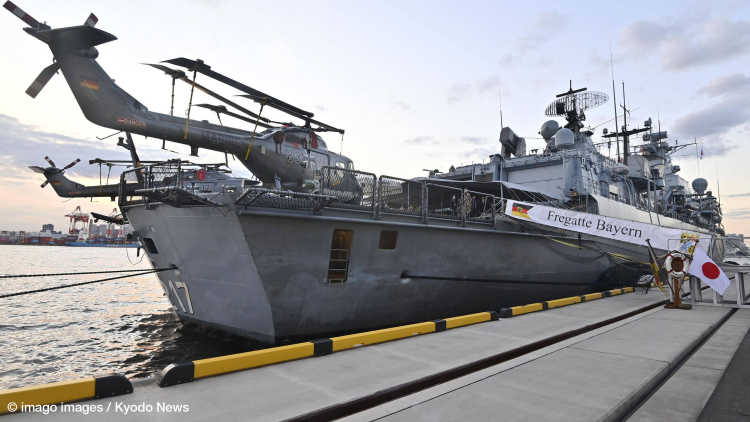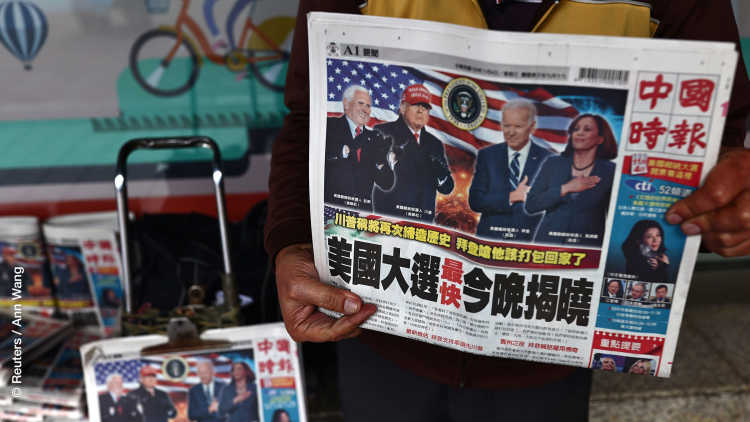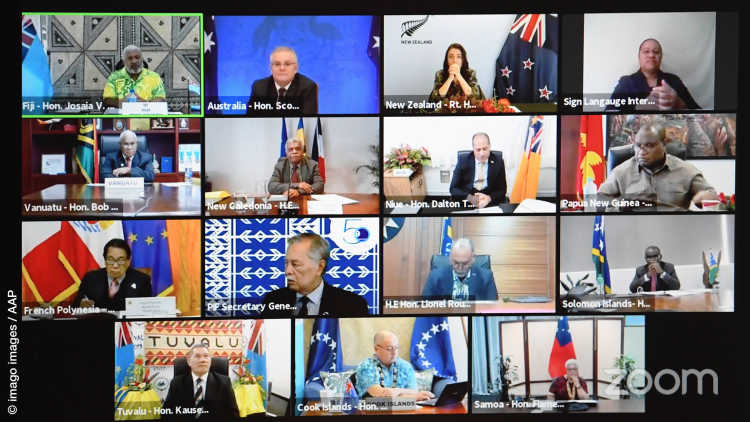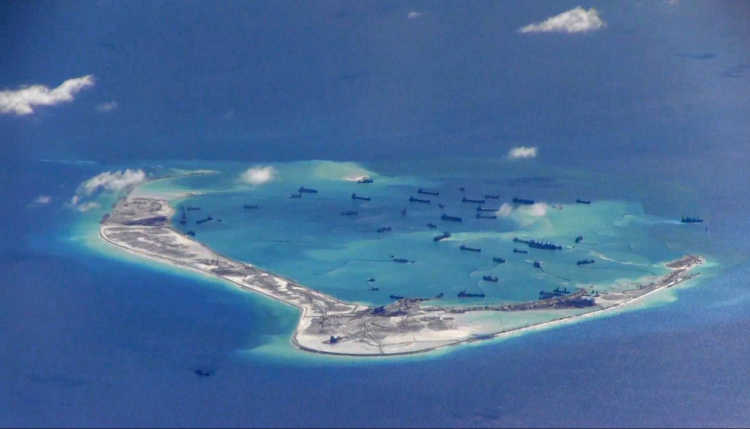- Home
- Publications
- GIGA Focus
- How to Anchor Germany’s Drifting Indo-Pacific Policy
GIGA Focus Asia
How to Anchor Germany’s Drifting Indo-Pacific Policy
Number 1 | 2022 | ISSN: 1862-359X

In recent months, the implementation of Germany’s Indo-Pacific policy from September 2020 has started to take shape. With maritime security concerns as principal drivers, naval deployments have taken centre stage. Yet, as the voyage of the frigate Bayern exemplifies, the German approach – similar to other European policies – suffers from contradictions which are hidden under the “rules-based order” label.
Adopting terminology that originated in Australia and Japan, also the German “Policy Guidelines for the Indo-Pacific” employ a variation of the rules-based order concept for describing what they seek to preserve.
Symbolically powerful naval deployments aimed at safeguarding the “freedom of navigation” through Southeast Asian waters have spearheaded the implementation of the Guidelines, while overshadowing their many other dimensions.
The conflation of legitimate concerns about Chinese expansion in the South China Sea with questionable projections of China’s linear path to hegemonic power and concomitant courting of “like-minded” “value partners” altered the Guidelines’ characteristically European emphasis on inclusivity, de-escalation, and the rule of international law.
The rules-based order has come to signify the common interest among a diverse group of powerful states in curbing Chinese influence. This complicates the question of which shared “values,” “rules,” and conceptions of “order” are at stake.
The increasingly wider usage of “rules-based order” has also led to policymakers glossing over the fact that they have themselves been part of, and are driving, the scramble for new spheres of influence.
Policy Implications
German policymakers must admit that talking about the rules-based order raises more questions than answers. This is also a precondition for getting clear about whether they seek to help contain China. To play a stabilising role, they and other European governments must listen to what the many less-powerful actors in the Indo-Pacific have to say, and clearly articulate the specific rules, norms, and institutions they are seeking to promote to the benefit of all.
Cooperation with Value Partners
On 2 August 2021, the frigate Bayern set sail for Indo-Pacific seas. It represented one of the first and most visible steps in the implementation of Germany’s “Policy Guidelines for the Indo-Pacific” issued a year earlier. The seven-month-long journey has been conceived as a naval diplomatic and security political mission for “showing the flag” in support of “value partners” who, like-mindedly, cherish the integrity of the rules-based order. It led the Bayern through the Suez Canal to Karachi, before crossing the Indian Ocean via the joint United States–United Kingdom base on Diego Garcia to Fremantle and Darwin; to Palau and the US territory of Guam, onwards to Tokyo and Busan; and then back through the South China Sea to Singapore, Ho Chi Minh City, across the Indian Ocean to Colombo and Mumbai, before returning to the Mediterranean.

Figure 1. The Route of the Bayern
Source: Bundeswehr 2022.
This deployment had long been awaited by defence officials and security analysts in Berlin, and in Washington, New Delhi, Canberra, and Tokyo too. Especially in the latter capitals, questions about Germany’s stance on China-related issues were becoming louder and louder. Some influential observers in Washington even lamented Europeans’ insistence on seeing China not only as a “systemic rival” but also as a “competitor” and “cooperation partner.” And the talk of a multipolar world in which Europe defines policy positions of its own, they argued, was playing dangerously into Chinese hands.
Given the different opinions on how to approach China, the decision to dispatch a warship came only after intense debate. And the Bayern’s chosen route stirred criticisms. For many, the frigate steering clear of the Taiwan Strait and disputed features in the South China Sea, and the offer of a port-call in Shanghai, meant to appease China. For the Chinese leadership, by contrast, these gestures were meaningless, and it rejected the port-call due to a lack of mutual trust. Thus, the Bayern’s mission can be seen as the epitome for how European Indo-Pacific policies are informed by and reverberate through transatlantic relations. As such, the journey put a spotlight on Germany’s struggles to balance security with economic interests. More importantly, however, it revealed the challenges that Europe faces when seeking to chart a distinct foreign policy course at this historical juncture in world politics.
The question is, thus, how to avoid self-fulfilling prophecies: How to enforce the rules-based order without compromising democratic institutions and human rights, and how to militarily stabilise the Indo-Pacific without contributing to the expansion of Sino–US rivalry into a bipolar – or multipolar – contest over spheres of influence? Should these questions be answered in ways that point to the deterrence and containment of China, then there is also an urgent need to be clear about the desired outcomes of and daunting risks involved in this strategy. As a corollary, decision makers would also need to ask themselves what “stability” and rules-based international order have come to mean in this context.
Following an overview of how the Guidelines define the overarching objectives and the international order they seek to safeguard, this policy brief then analyses the multiple interpretations and practical application of the rules-based order concept. It concludes with tentative answers to the most pressing questions, as well as recommendations on how to mitigate the contradictions between stated goals and actual practice in Indo-Pacific politics.
The Rules-Based Order as Desired State of the World
Like their peers elsewhere in Europe, German policymakers have also come to recognise the threats to their interest in a stable and prosperous region coming from the deepening rivalry between the US and China as well as from the latter’s maritime claims. However, they are ambiguous about the causal chains leading to these developments. Consequently, it remains unclear how exactly, and in cooperation with whom, European policymakers want to strengthen which norms and institutions. Despite the relatively clear definition of the “rules-based order,” Germany’s Guidelines also suffer from this deficiency.
The German government only embraced the Indo-Pacific perspective after the Association of Southeast Asian Nations (ASEAN) had itself done so. The “ASEAN Outlook on the Indo-Pacific” provided an alternative interpretation of international order based on the conviction that security can only be achieved through cooperation. The motivation to formulate an Indo-Pacific policy followed the realisation that, due to Asia’s growing economic and political weight and the hardening of Sino–US rivalry, the future of the “international order” will be determined in that region “more than anywhere else” (FFO 2020: 2). Hence Germany, as a globally active “trading nation” and “proponent of a rules-based international order […] must not content itself with remaining on the sidelines, as a mere observer of these dynamic developments” (FFO 2020: 2). Even more so because Germany’s prosperity depends on open shipping routes, physical as well as digital connectivity, and participation in growth markets. Accordingly, the Guidelines follow earlier French policy papers in concluding that security can only be achieved in cooperative ways: “[The Federal Government] does not consider containment and decoupling strategies to be conducive [to these ends]” (FFO 2020: 11). Yet, apart from talking about the Sino-US rivalry as an undesirable scenario rather than existing reality, Germany has also adopted a more normative perspective than France.
The Guidelines define the set of institutions to be preserved as follows: “At the heart of the rules-based order are the Charter of the United Nations, the Universal Declaration of Human Rights and other human rights conventions as well as disarmament, arms control, and non-proliferation treaties. In the Indo-Pacific region, which is dominated by two large oceans and is no stranger to maritime conflict situations, the integrity and application of the United Nations Convention on the Law of the Sea play a crucial role” (FFO 2020: 24).
At the same time as emphasising the need to cooperate with diverse regional actors, however, the Guidelines also asserted that Germany must “even more strongly address the security concerns of its long-standing partners” (FFO 2020: 2). The document argues for complementing existing relationships in the political dimension – “including closer cooperation in the area of security [where] closing ranks with democracies and partners with shared values in the region is particularly important” (FFO 2020: 9). Consequently, inconsistencies between stated goals and actual practice appear when the policy’s implementation requires the unpacking of what the rules-based order concept concretely stands for.
The Bayern’s Mission
Being one of the first visible actions taken under the Guidelines, and the most cautious by a major European actor, the German navy’s Indo-Pacific deployment represents a suitable case for examining how actual practice relates to the policy objectives discussed above. As such, the Bayern’s voyage tells the story of how the idealised view of a singular and universally beneficial international order – that is, the so-called rules-based order – clashes with the reality of multiple and changing international orders.
While the Federal Foreign Office kept an eye on the evolving discourse about the Indo-Pacific and eventually led the creation of the comprehensive and balanced Guidelines, the Ministry of Defence would push security cooperation across the region. For the latter the question of “order” has been central, and it sees the world through a transatlantic lens. As then Defence Minister Kramp-Karrenbauer pointed out: “[Ours are] times of disruption and uncertainty [… the] world is in disarray” (Kramp-Karrenbauer 2019). The “liberal international liberal order as it had been established after World War II and expanded thereafter [which] continues to determine our lives until today [and] defines us [is being undermined],” she added (Kramp-Karrenbauer 2019).
Although conceding that support for the rules-based order must be extended in tandem with France, and requires a strong Europe, Kramp-Karrenbauer’s worldview remained close to that of the US. This discrepancy became visible in her public disagreement with President Macron over the need for European “strategic autonomy” in conducting foreign policy, under the impression of the Trump administration’s confrontational approach to international affairs. Lamenting that it had become “somewhat fashionable” to express “very critical views” on the Trump administration’s actions, Kramp-Karrenbauer (2019) cautioned fellow Germans to never forget America’s part in shaping Germany’s development. That is, Germany owes its freedom and prosperity to America’s longing for freedom, the same longing that also “broke the spell” over East Germany, brought the Berlin Wall down, and delivered freedom to Eastern Europe. And now that the US has become tired of shouldering this increasing burden, she argued, it was also on Germany to fulfil its duty and contribute to protecting and developing the international order – as it has been doing, for instance, in Afghanistan (Kramp-Karrenbauer 2019). Military engagement there, she pointed out, had been an act of “lived solidarity” with partners and allies, and a similar “act of solidarity” was wished for, primarily by Australia, India, Japan, and South Korea, who all feel pressured by China’s increasing claims to power.
This view came to define Germany’s Indo-Pacific policy in practice, and it was the message that eventually reached the region. While China rejected the request for a port-call, Australia, Japan, and the US very much welcomed the Bayern’s deployment as a first, overdue step towards greater European commitment. Strengthened military cooperation with Australia and Japan emerged as the core not only of the Bayern’s mission but also of the Guidelines as they have been implemented to date. For 2022, the German Ministry of Defence announced the dispatch of fighter jets to Australia, followed by their visit to Japan. For 2023, the deployment of a warship, accompanied by a logistics component, is being considered. More importantly, the Bayern’s visits to Australia and Japan coincided with the beginning of closer consultation on regional security. This has been institutionalised in so-called 2+2 dialogues, where defence ministers will be making foreign policy too.
Cooperative versus Collective Security
Through the adoption of this Indo-Pacific perspective, the Ministry of Defence came to play an important role in the making of Germany’s Asia policy. It not only pushed for the Guidelines’ adoption but also spearheaded their implementation, helping shape the perception of Germany’s intentions in the region. It was Kramp-Karrenbauer who, on several (virtual) trips to the region in 2020 and 2021, explained the Guidelines, listened to value partners’ concerns, and responded with the dispatch of the Bayern. Importantly, and unsurprisingly, given the fact that military actions connote much stronger symbolism and continuity than diplomatic exchange, also the navy has taken on the role of explaining and implementing Germany’s Indo-Pacific policy. This happened, for example, in various closed-door meetings, and through public speeches given in Tokyo, Singapore, and New Delhi.
The leading role of the armed forces raises the question of whether cooperative or rather collective security will guide the future course of action. The former means to seek peace through cooperation, also with rivals and enemies. The latter focuses on the deterrence of unfriendly actors through military alliances. Comments made in Tokyo in November 2021 suggest that alliance politics based on the paradigm of collective security determine the approach. The Bayern’s mission to “show the flag” was meant to signal general opposition to Chinese practices. Yet, the comments made went further than siding with international law. They suggested that democratic value partners who face pressure from Chinese actions are seen as representing international law and as guarantors of the rules-based order.
While the 2016 Philippines versus China arbitration confirmed many of the latter’s claims and actions in the South China Sea to be illegal, this does not mean that other actors’ practices themselves conform to the laws of the sea which China breached. This includes, for instance, powerful states’ refusal to accept compulsory dispute-settlement procedures as well as coastal states’ use of expansive definitions of “islands” to claim vast Exclusive Economic Zones (EEZs), and restrictive views on the freedom of navigation for warships. Unusual was also the German navy’s pledge to “show solidarity” with Japan in its struggles with China, to help it “defend what we as free peoples value” (JNPC 2021). It raises the question of where Germany stands in the dispute between China and Taiwan with Japan over what the three parties, respectively, call the Diaoyu/Diaoyutai/Senkaku rocks, in the East China Sea. This is the principal driver of antagonism between China and Japan, and the latter’s main motivation in reaching out to Indo-Pacific partners. It would be remarkable if Germany went further than the US, which formally remains neutral on the dispute and only recently committed to defending the status quo of Japan’s administrative control.
Speaking in Singapore in December 2021, the Chief of the Navy elaborated on how Germany seeks to protect the “rules-based international order.” He clarified that the 2021 Indo-Pacific deployment should be seen as a first step towards greater engagement. Yet apparently becoming aware of the different interpretations of the rules-based international order after a visit to South Korea, he repeatedly emphasised that Germany had no “hidden agenda,” that it was present to defend its own interests alone (especially in open waterways), and that future operations would be designed according to the region’s response (IISS 2021).
Yet, the navy’s floating of interest in establishing a logistics hub in Singapore, and the prospect of a German naval presence as part of joint European or US carrier strike group deployments, raised questions among Southeast Asian officials. They probed how the German government intends to militarily support the rules-based order without fuelling tensions, and thereby undermine its purported objective of furthering regional peace and stability (IISS 2021). These concerns are not new. Especially Singaporean, Indonesian, and Malaysian representatives had been voicing them towards various external actors – and unambiguously so – for some time (e.g. Lee 2019). Similarly, Pacific Island states have refused to subscribe to the binary logic of great power rivalry.
The confused messaging on Germany’s Indo-Pacific policy reached its peak after the Chief of the Navy, on the occasion of the Bayern’s port-call to India in January 2022, offered controversial views on various issues of domestic and international politics. He resigned within days, mainly due to comments on the escalating situation in Ukraine. Yet the reason for his ambivalence towards President Putin’s threat to invade that country is grounded in the conviction that (white, Christian) Russia was needed as a partner in addressing the China threat (IDSA 2022). This viewing of the rules-based order through civilisational – that is, racial lenses – aligns with Trump officials’ perspectives (Gehrke 2019). In essence, it also corresponds to the Australian Liberal Party’s worldview. Not least, the current Chinese, Indian, and Japanese leaderships have come to define their nations in distinctly ethnical terms too. These all go against the rules-based order as defined in the Guidelines and are irreconcilable with the European interest in a stable Indo-Pacific.
In other words, the rules-based order interpreted through the lens of collective security among like-minded value partners lends itself to the simplistic view of world politics as a clash of civilizations. The rules-based order has proved unworkable because it disregards the complexity of regional politics and, instead, provides a stage for the pursuit of parochial national interests. Therefore, German Indo-Pacific policy has gone adrift and only a deeper understanding of the region shows where it can be anchored.
What Rules-Based Order(s)?
The Indo-Pacific as a Geopolitical Tool
Interestingly, the Indo-Pacific perspective on politics in Asia and the pertaining emphasis on the rules-based order have, first and foremost, caught on among strategists and leaders of great and allied middle powers, rather than in the region’s states most affected by Chinese policies. The Indo-Pacific and rules-based order concepts came to prominence after Japanese governments had, from 2007 onwards, been promoting Indo-Pacific perspectives under various labels, and Australian strategists found them useful too (Wirth and Jenne 2022). The discovery of China’s large-scale land reclamations in the South China Sea and the 2016 arbitration rejecting Chinese claims in favour of the Philippines then led to the broader acceptance of the two concepts. In any case, European policymakers’ reliance on the Australian and Japanese governments for devising and implementing Indo-Pacific policies calls for a closer look as to why strategists in Canberra and Tokyo have enthusiastically embraced these terms.
The common argument that Japan and the US cannot face a rising China alone does not explain why mostly extra-regional actors want to get involved. Moreover, it contradicts the assessment – per European Indo-Pacific strategies and Southeast Asian observers – that Sino–US rivalry has a destabilising effect. A more sophisticated understanding of the region suggests another factor being in play. Bringing more players to the table, Indo-Pacific policies mitigate the contradiction between Australia’s and Japan’s strong economic dependencies on China, and their heightening security and political dependence on the US. Yet, the deepening of Sino–US rivalry and the related exacerbation of Japan’s and Australia’s dilemmas of entrapment versus abandonment in their alliance relationships are also problems of their own making. Even though the Chinese government must accept most of the blame for escalating tensions, Australia and Japan are no mere bystanders to intensifying Sino–US great power rivalry. In several ways, the two island countries, whose conservative leaders have long been uneasy with their geographical location in “Asia,” contribute to it. The fear of being abandoned by the US has, for instance, made the governments in Canberra and Tokyo resist President Obama’s attempts to reduce the role of nuclear weapons and move away from the first strike doctrine. Moreover, their demands for reassurances also shaped the Obama administration’s “Pivot to the Asia-Pacific,” which in turn heightened threat perceptions among historically anxious Chinese leaders – thereby accelerating the escalatory spiral (Ross 2012). Australian and Japanese leaders’ chose to put themselves on the frontline of this great power struggle.
Making Japan “Great Again”
Ruling Japan almost uninterruptedly since 1955, the Liberal Democratic Party (LDP) was historically formed as an anti-Communist party. Thus, very much concerned with Japan’s status as the most advanced Asian member of the (Western) international community, LDP elites have been grappling with Japan’s failing development model for some time. The end of the Soviet threat, combined with the “lost decades” of economic doldrums as well as the Chinese economy’s taking over in 2010, have called into question Japan’s place in the post–Cold War world and shattered these elites’ confidence in their country’s future. The earthquake, tsunami, and Fukushima meltdown in March 2011 then triggered a national crisis so deep to be compared to 9/11 and (defeat in) World War II (Maslow and Wirth 2021).
Thus, socio-economic problems not only made Chinese elites grow more nationalistic and confrontational towards Japan; they also prompted the LDP to become more nationalistic too. Consequently, disputes over uninhabited rocks escalated not only with China and Taiwan but also with South Korea – and so did controversies over wartime history. To gain the upper hand in these disputes and preserve their leading status in Asia, conservative politicians developed the geopolitical imageries of an “Arc of Freedom and Prosperity” and, later, of a “Democratic Security Diamond.” As part of a “value-oriented” diplomacy, these would situate Japan among a group of rule-making democracies (Wirth 2015). In 2016, the third attempt at this – known as “Free and Open Indo-Pacific” policy – succeeded.
In this environment, two controversies over the Diaoyu/Senkakus in 2010 and 2012 triggered a tailspin in Sino–Japanese relations. As a result, long-standing anxieties over sea-lane security served to link the Diaoyu/Senkaku dispute with the escalating Sino–US dispute over naval activities in the EEZs off China’s coastline. Predating the China threat, in a 1994 report, Japanese strategists had already elevated supply routes through the Malacca Straits “choke-point” to a question of “life and death.” This is how China and Japan have come to see the openness of maritime transport through Southeast Asia as threatened by the respective other, even though they are in the same boat when it comes to their dependency on sea-lanes. While the Chinese leadership decided to enlarge and militarise several disputed features in the Spratly Islands to defend against the US and Japan, the latter equipped the Ryukyu Islands with anti-ship and anti-aircraft missiles – thus potentially barring Chinese vessels from reaching the Pacific Ocean. It has become impossible to say what came first: maritime disputes or mutual threat perceptions.
Overcoming Australia’s Insularity
Australia is located far from these hotspots. Yet, having fought in the Korean and Vietnam Wars, it has been deeply involved in regional politics. Australia’s ever-deepening economic dependence on China – not only for coal, natural gas, iron ore, and agricultural exports, but also for incoming higher-education students and tourists – has led to increasing friction in their bilateral relations. This was exacerbated between 2017 and 2019 when a series of sensationalist media reports and general warnings from intelligence agencies alleged/revealed Chinese attempts to influence Australian politics. Often, political figures and pundits depicted these attempts as existential threats to “our way of life” (cited in Brophy 2021: 94). Tensions reached their climax when Australian policymakers, in summer 2020, led public calls for an inquiry into whether SARS-CoV-2 had leaked from a laboratory and the Chinese government retaliated with restrictions on the import of specific Australian products. Aggressive Chinese diplomacy only fuelled these tensions. Yet, there are also structural causes.
A close reading of Australian defence and foreign policy papers reveals a deep-seated anxiety about Australia’s location in Asia, far from Europe and the US. This imagined insularity has been mitigated through Australia’s strong security partnership with the US, which anchored it in the West (Gyngell 2017). Therefore, Australian defence white papers go as far as perceiving any changes to an imagined stable peaceful and universally beneficial US-led rules-based order – allegedly in existence for no less than 70 years – as a threat to national security (Wirth 2019). This explains why Australian strategists are preoccupied with the Chinese threat to the freedom of navigation (for warships) along sea lanes across Southeast Asia, on which they only partially depend for their very trade with China.
Consequently, the deepening polarisation in Congress during the Obama and Trump administrations, and the latter’s disruptive approach to US alliances, caused serious concerns. These developments prompted Australian politicians to assert their role as staunch US allies. As Brophy notes, Australia’s China policy had been “noisy and attention-seeking” and aimed at advertising the country as the “‘canary in the coal mine’ of China’s rise” (Brophy 2021: 12). Thus, unlike East Asian governments, who are much more exposed to Chinese pressure, Australian politicians have sounded the alarm bells and called for a broad coalition to contain China.
For these reasons, Australia’s and Japan’s status of anxious US allies grappling with specific China-related grievances do not necessarily make their views and policies conducive to mitigating the intensifying great power rivalry. And, calling out China’s violations of international law in the South China Sea and egregious human rights abuses is not the same as supporting the rule of international law and protecting human rights. Rather, the rules-based order often appears to be code for preserving political power – in both international and domestic politics. For elected governments to (implicitly) contrast their actions with China’s to highlight their democratic credentials seems awkward. Given China’s abysmal record, such a comparison may, indeed, provide cover for much less repressive but still decidedly undemocratic practices at home. Yet, civil and political liberties have come under significant threat in all member states of the Quadrilateral Security Dialogue, who like to position themselves as democratic counterweights to China and feature prominently as like-minded value partners in European Indo-Pacific strategies (IDEA 2021).
How to Anchor Indo-Pacific Policies
Rather than sharing common values, like-minded Indo-Pacific state actors merely share interests in curbing Chinese influence. This inconvenient truth calls into question the German and other European approaches to the Indo-Pacific with a focus on a few value partners. Indeed, if values are not to be hollowed out, Indo-Pacific policy measures must be scrutinised according to self-proclaimed standards. For example, the claim to protect the rules-based order already clashed with the reality of Indo-Pacific power politics when the Bayern made a bunker stop at the joint US–UK base on Diego Garcia. The International Court of Justice, the UN General Assembly, and the International Tribunal of the Law of the Sea had all expressed the view that the UK is obliged to return the Chagos Islands, where the base is located, to Mauritius and to allow several hundred evicted residents to return.
But even if Indo-Pacific policymakers – contrary to declared objectives and against the principles of the ASEAN Treaty of Amity and Cooperation, to which Germany acceded in November 2019 – expressly aim at some sort of China containment, the question what constitutes “stability” remains. This can only be answered by mid-sized and smaller regional actors. It is them who will be forced to choose sides in a multipolar confrontation between China, the US, the latter’s Australian and Japanese allies, and India, as they vie for new spheres of influence.
To anchor Indo-Pacific policy, in other words, German and likewise other European authorities, should carefully listen to, and take seriously, what actors other than naval powers have to say. To further democratic values and human rights, they should disaggregate static conceptions of “democracy.” To protect democratic institutions, civil and human rights, and international laws, they must name the specific good under threat, and act on the specific threat. This calls for abandoning the euphemistic rules-based order term. To prevent Germany’s Indo-Pacific policy being cast adrift between the various great powers’ interests, decisions must be made at the political level. These must be based on regional expertise, gained through careful observation and attentive conversations in and with the region. In any case, to avoid the danger of further policy failures, German and European authorities must beware of temptations to misinterpret the well-advertised views of national-security circles and specific interest groups as accurate descriptions of regional politics. This clearer focus will require self-critical reflection. Ultimately, doing that will facilitate the building of stabilising political consensus nationally, in Europe, across the Atlantic, as well as in the Indo-Pacific itself.
Footnotes
References
Brophy, David (2021), China Panic: Australia’s Alternative to Paranoia and Pandering, Carlton VIC: La Trobe University Press.
Bundeswehr (2022), Indo-Pacific Deployment 2021, accessed 7 February 2022.
FFO (Federal Foreign Office) (2020), Policy Guidelines for the Indo-Pacific, accessed 31 January 2022.
Gehrke, Joel (2019), State Department Preparing for Clash of Civilizations with China, in: The Washington Examiner, 30 April.
Gyngell, Allan (2017), Fear of Abandonment: Australia in the World since 1942, Carlton VIC: La Trobe University Press.
IDEA (2021), The Global State of Democracy 2021: Building Resilience in a Pandemic Era, accessed 31 January 2022.
IDSA (2022), Talk by Vice Admiral Kay-Achim Schonbach, Chief of the German Navy, 21 January, accessed 31 January 2022.
IISS (International Institute for Strategic Studies) (2021), 42nd IISS Fullerton Lecture: The Future of Indo-Pacific Maritime Security, 21 December, accessed 31 January 2022.
JNPC (Japan National Press Club) (2021), Doku no Indo Taiheiyo Senryaku [Germany’s Indo-Pacific Strategy], 9 November, authors’s translation, accessed 31 January 2022.
Kramp-Karrenbauer, Annegret (2019), Rede der Ministerin an der Universität der Bundeswehr München, 7 November, author’s translation, accessed 31 January 2022.
Lee, Hsien-Loong (2019), Lee Hsien Loong, Prime Minister of Singapore, opens the IISS Shangri-La Dialogue, 31 May, accessed 31 January 2022.
Maslow, Sebastian, and Christian Wirth (2021), Crisis Narratives, Institutional Change, and the Tranformation of the Japanese State, Albany: SUNY Press.
Ross, Robert S. (2012), The Problem with the Pivot: Obama’s New Asia Policy Is Unnecessary and Counterproductive, in: Foreign Affairs, 91, 6, 70–92.
Wirth, Christian (2019), Whose ‘Freedom of Navigation’? Australia, China, the US, and the Making of Order in the ‘Indo-Pacific’, in: The Pacific Review, 32, 4, 475–504.
Wirth, Christian (2015) Securing Japan in the ‘West’: The US-Japan Alliance and Identity Politics in the Asian Century, in: Geopolitics, 20, 2, 287–307.
Wirth, Christian, and Nicole Jenne (2022), Filling the Void: The Asia-Pacific Problem of Order and Emerging Indo-Pacific Regional Multilateralism, in: Contemporary Security Policy, forthcoming.
General Editor GIGA Focus
Editor GIGA Focus Asia
Editorial Department GIGA Focus Asia
Regional Institutes
Research Programmes
How to cite this article
Wirth, Christian (2022), How to Anchor Germany’s Drifting Indo-Pacific Policy, GIGA Focus Asia, 1, Hamburg: German Institute for Global and Area Studies (GIGA), https://doi.org/10.57671/gfas-22012
Imprint
The GIGA Focus is an Open Access publication and can be read on the Internet and downloaded free of charge at www.giga-hamburg.de/en/publications/giga-focus. According to the conditions of the Creative-Commons license Attribution-No Derivative Works 3.0, this publication may be freely duplicated, circulated, and made accessible to the public. The particular conditions include the correct indication of the initial publication as GIGA Focus and no changes in or abbreviation of texts.
The German Institute for Global and Area Studies (GIGA) – Leibniz-Institut für Globale und Regionale Studien in Hamburg publishes the Focus series on Africa, Asia, Latin America, the Middle East and global issues. The GIGA Focus is edited and published by the GIGA. The views and opinions expressed are solely those of the authors and do not necessarily reflect those of the institute. Authors alone are responsible for the content of their articles. GIGA and the authors cannot be held liable for any errors and omissions, or for any consequences arising from the use of the information provided.

































